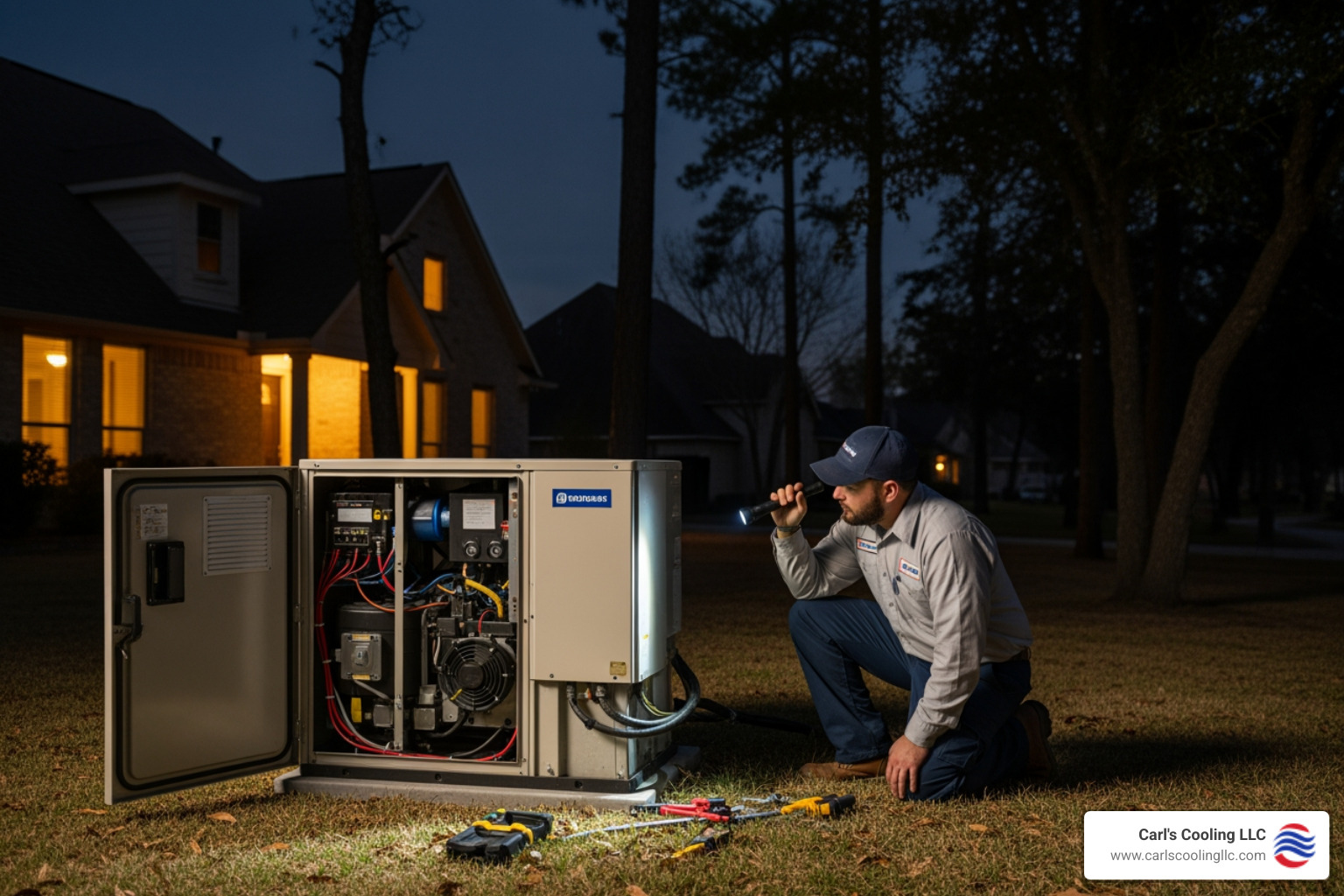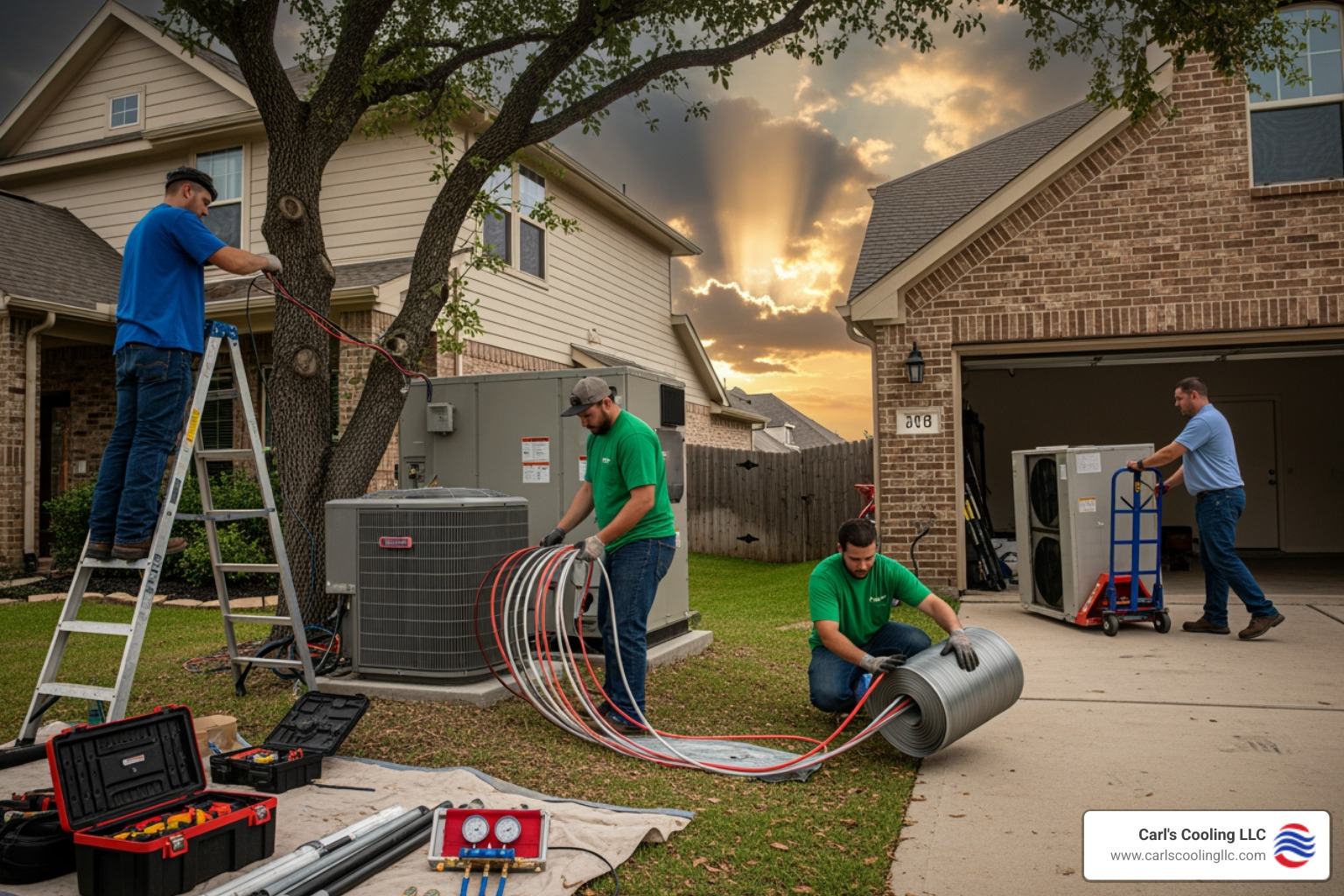Air conditioning systems tend to operate quietly and without disruption, so when strange sounds begin to emerge, it usually signals something is not right. In Woodforest, where summer temperatures can rise quickly, a reliable AC system is key to staying comfortable. That is why any unusual noise, whether it is a hum or a pop, should not be brushed off. These sounds often hint at underlying mechanical or electrical issues that, when ignored, may lead to bigger problems.
Responding promptly to odd AC noises can help prevent more expensive repairs, sudden breakdowns, and loss of cooling at the worst times. Being able to recognize these sounds and understand what they might mean is one of the first steps to keeping your system running smoothly. The goal is not to fix them yourself, but to know when it is time to call in someone who can.
Common AC Noises and What They Mean
Unusual noises coming from your AC system often point to a need for repair. Each sound offers a clue about what might be going wrong. Recognizing them early can help avoid more serious damage.
Here are some common noises people in Woodforest might notice, along with a breakdown of what they often signal:
- Buzzing: A buzzing sound can come from a number of causes. It might be due to loose parts vibrating against the unit’s casing. It may also mean there is an issue with the electrical connections, such as a failing contactor relay switch or a damaged capacitor. Over time, ignoring this sound could lead to a more widespread electrical failure.
- Rattling: If you hear rattling when the AC kicks on or shuts down, there might be debris inside the outdoor unit or a screw that has worked itself loose. Rattling can cause wear on parts it comes into contact with, which can shorten the system’s lifespan if left untreated.
- Squealing: A high-pitched squeal usually means that a fan belt is slipping or worn. In some cases, it is the blower motor struggling to turn. If the noise starts up suddenly and occurs each time the system runs, it is best not to wait on this one.
- Hissing: A hissing sound near the indoor unit often points to a refrigerant leak or an issue with internal pressure. Leaks like these can reduce cooling performance, increase energy use, and stress the system. Delaying service risks more than discomfort. It can lead to compressor failure if the refrigerant level drops too low.
For example, a homeowner in Woodforest might notice a soft hissing behind their wall vents followed by weak airflow throughout the house. That is often a sign of a refrigerant line issue, and calling for help quickly could prevent full system failure.
Once these noises start, the system usually will not return to normal on its own. That is why it helps to understand which sounds matter and what they indicate. It is not about diagnosing every detail but recognizing when your system is trying to tell you something is wrong.
Why You Should Address Strange Noises Promptly
Ignoring strange AC noises can lead to much more than annoyance. These sounds usually show up early in the problem cycle, giving homeowners in Woodforest a chance to fix the issue before it spreads. Waiting it out or assuming the noise will go away often results in bigger repairs that are more expensive and time-consuming.
Any AC system under stress takes longer and uses more energy to cool the home. Unusual sounds are often signs that your unit is struggling. Whether it is a blocked airflow, worn-out motor, or refrigerant leak, these problems force the system to work harder. In summer, that extra strain can push a once-fixable issue straight into failure, likely when you need the system most.
Delays can also reduce the lifespan of your AC system. Loose components can put wear on neighboring parts. Refrigerant loss can damage the compressor. Electrical faults can lead to system-wide outages. In many cases, a noise that could have been resolved quickly turns into a complete system issue when left unresolved. That is why timing plays such a big role.
In Woodforest, summer brings both heat and humidity. If the AC unit starts underperforming due to internal damage caused by ignoring loud or unusual noises, your indoor air quality and comfort can decline fast. If the unit is down for any length of time, rooms heat up quickly, especially upstairs or spaces without ceiling fans or shade.
What Our Technicians Look For During Repairs
When our professionals arrive for an AC noise complaint, they do not just listen to the noise. They look deeper to uncover what is causing the sound and how it is affecting performance. These service calls are thorough and practical, focused on getting the unit back to reliable operation while reducing the risk of future issues.
Here is what our technicians check when responding to strange noise complaints:
1. Exterior unit inspection to identify loose fan blades, fasteners, or debris.
2. Motor and blower testing to measure resistance and alignment.
3. Inspection of belts, pulleys, and mountings for signs of wear or stress.
4. Electrical checks to confirm safe voltage levels and secure connections.
5. Refrigerant pressure testing if hissing or short cycling are present.
By working through these steps, the root cause usually surfaces fast. If a part has failed or is about to, our technicians will spot it before it causes further damage. Fixing the issue early helps reduce energy waste, avoid emergency repairs, and restore quiet, efficient function to the AC system.
Woodforest Homes Need Reliable Cooling Support
During summer in Woodforest, even a few hours without AC can make a home uncomfortable fast. With heat rising and humidity levels climbing, having a dependable cooling system becomes a daily need, not a luxury. When that system starts making unsettling sounds, trust your instinct that something is not right.
The layout of many homes in Woodforest includes open living areas, lots of windows, and larger square footage. All of these can heat up fast if the AC stops working. If even a single air handler or zone begins to underperform due to a faulty blower or compressor noise, it affects comfort across the entire home. This is why fast action matters. Spotting problems when noises first start makes the chances of avoiding a complete breakdown much higher.
Keeping cooling systems in check during summer is part of living comfortably in cities like Woodforest. Serious issues often start with noises people do not recognize. Taking those early sounds seriously makes it easier to stay ahead of bigger, costlier problems. With the right support, your AC can stay reliable even through the hottest weeks.
Stay Ahead of the Sound to Stay Comfortable
Strange sounds coming from an AC system should not be treated as something normal. They represent a warning that something inside your system is not working the way it should. Whether it is a damaged fan blade, a worn-out belt, or a refrigerant leak, every one of these problems starts small. Catching them early keeps the system steadier, your home cooler, and your repair costs lower.
Homeowners in Woodforest who take these unusual noises seriously often avoid major disruptions. While it is natural to hope the problem will go away, most AC issues do not fix themselves. Once your system starts sounding off, it is time to bring in a technician who knows exactly what to look for and how to handle it.
Quiet, efficient operation is what every strong air conditioning system should deliver. The moment it starts drifting from that, whether through a buzz, click, rattle, or squeal, it is time to take a closer look. Addressing those signs quickly is your best bet for avoiding stressful, uncomfortable summer days in Woodforest.
If your system's unusual sounds have raised concerns about its efficiency, trust the experts at Carl's Quality Cooling and Heating LLC to deliver a prompt and thorough solution. With our reliable AC repair in Woodforest, you can restore your comfort quickly and avoid more costly damage down the road. For a quick estimate or to book a service visit, please contact us today.






